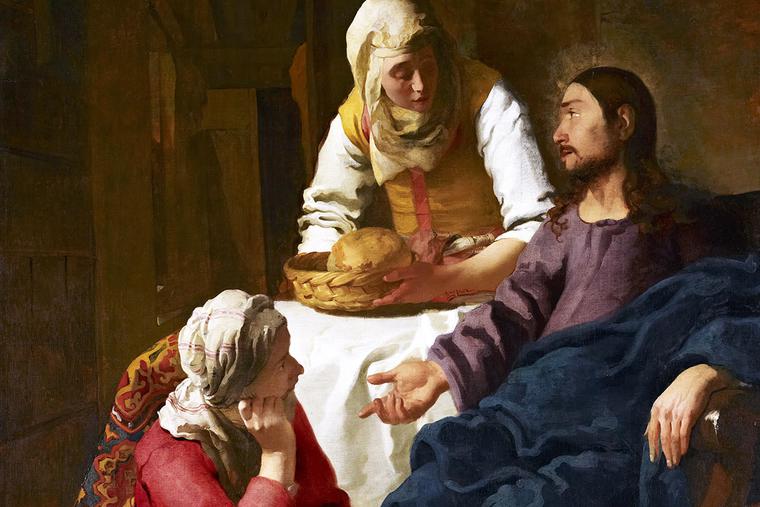How a Choleric Catholic Can Please and Glorify God
“The Father’s free gift which makes us his sons and daughters, and the priority of the gift of his grace, enable that constant sanctification which pleases God and gives him glory.” (Evangelii Gaudium)

“Give it up to God.”
This phrase is one of the most powerful spiritual tools of the Christian life. It’s especially popular among Catholics who are joining their sacrifices with Jesus’ ultimate sacrifice, sanctifying themselves by accepting the small and large crosses of their lives. Done right, it takes us away from sin, helps us understand God better, and drives us to accept his will more and better.
It’s also a trite and overused phrase, and it drives me crazy. I’m a choleric whose top love language is “acts of service” — there’s no “giving it up” in my psychology. There’s only pro-actively, purposefully making someone’s life better.
But how do you make God happier or better, or improve his state of life? If that were truly possible, he’d be human, not God. This has been a spiritual question for almost a decade — but I have come to three conclusions about how we mere humans can please God.
First, make his Cross easier
Christ died for our sins. Catholics are reminded of that every Sunday, when we see him hanging over the altar. Until recently, I saw the Cross only as a reminder that we put him there — a condemnation of our actions but not our souls. And since he’s told us that we’re all going to sin, there’s nothing I can do to help ease his pain. I can either feel guilty or, as I’ve often done, counter with, “Well, you made me this way. I didn’t ask to be a sinner. This is your fault.”
But there’s another path for the acts-of-service Christian that God recently gave me. We can ease his burden, his Cross, by avoiding sin, because each sin we actively choose not to commit is a small gift to him.
Should we sometimes “give it up to God”? Yes. But sometimes we should also give it up for God.
Second, make our acts of service better
St. Martha joins St. Peter and St. Thomas in being perhaps the most criticized of Jesus’ companions (with the exception of Judas). She is cited as the epitome of being too busy to spend time with Christ, whereas Mary “has chosen the better path.
However, Jesus didn’t chide Martha for serving food and drink, or for welcoming people into her home. He chided her for being resentful of Mary, for being flustered, for being overwhelmed with relatively minor matters when Christ himself was present.
For the choleric acts-of-service Christian, Martha and Peter are great examples of our personality traits. She was serving, but her service wasn’t done peacefully. And Peter was often acting — with the sword, walking on water, declaring Jesus to be God while moments later rebuking and denying him — without consideration for the wider perspective or the consequences of his actions.
So, the second way for us to make God happier and better is to take the time to actively listen to him so that we act morally and prudentially in line with his designs — helping others and him by avoiding sin and doing good. Praying the Rosary and the St. Ignatius daily reflection are two great examples.
Third, just listen
Okay, this one’s the hardest. It involves just … sitting there. Doing nothing. Hanging around waiting for Elijah’s whisper-in-the-wind instead of the hurricane. Waiting for God to, in his own sweet time, converse with us.
If I struggle with the first step, and I’m not good at the second, I really stink at the third. The irony is that I’ve gotten pretty good at spending quality time with my wife, because she’s right there. I can see how improving my quality time skills helps her.
I don’t have a complete answer to be better at this third skill. The best I can come up with is that the choleric acts-of-service Christian should see God as a friend and mentor who wants simply to be with us. I think that just “being with us” would please him because when we sin, or rush through life, or jump to acts of service without the proper foresight, we aren’t spending the kind of time that he spent with Adam or Moses. And as one priest put it to a group I was part of, meditative prayer such as Adoration of the Blessed Sacrament is the unquestionably best way to commune with God, to know his will, and to act in line with his will.
Or maybe the answer is as simple as this: for the choleric acts-of-service Christian, sitting still with God is a true act of service — a sacrifice that we give up to him which makes our acts of service all that much better. Like my friend Dave Nevins says, about choleric prayer: “Let me know what you want me to do, God. I’ll do it really well. Just let me know. Any time now.”
- Keywords:
- choleric
- temperaments












